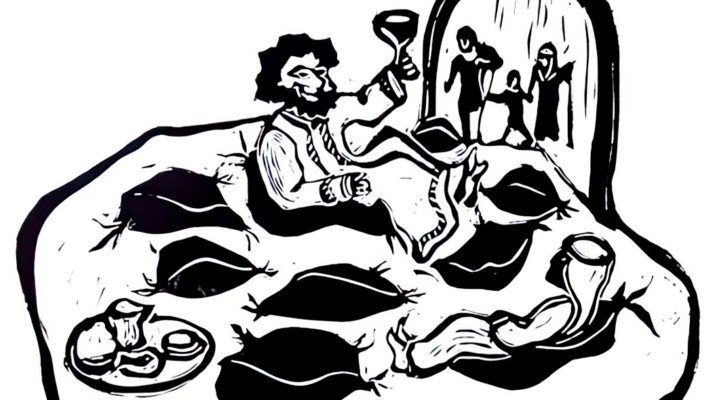Luke 14:1, 7-14
Ordinary C40
1 AOn one occasion when Jesus was goingB to the houseC
A {untranslated} = ginomai. This is to come into being, to happen, become, be born. It can be to emerge from one state or condition to another or is coming into being with the sense of movement or growth.
B “going” = erchomai. This is to come or go.
C “house” = oikos. This is house – the building, the household, the family, descendants, the temple.
of a leaderD of the PhariseesE to eatF
D “leader” = archon. From archo (to rule, begin, have first rank or have political power). This is ruler, leader, magistrate, official, prince, chief.
E “Pharisees” = Pharisaios. From Aramaic peras (to divide, separate) and from Hebrew parash (to make distinct, separate, scatter). This is a Pharisee, a member of a Jewish sect active in the 1st century. Their name meant separate in the sense of wanting to live a life separated from sin. Whereas the Sadducees were part of the priestly line and inherited their religious position and responsibilities, Pharisees were regular people who studied the scriptures and offered guidance to regular folk. Sadducees were often wealthier and willing to sacrifice their identity to rub elbows with Roman society. Pharisees were often more concerned with what it meant to follow God without compromising what made them different as followers of God. Sadducees primarily believed in that which was written down (the first five books of the Bible) and Pharisees believed in the Bible and the traditions of the elders. Pharisees had a very wide range of interpretations and diversity of opinion. Their standard mode of religious engagement was lively debate with one another. To argue religion with another teacher was to recognize that they had something of value to offer.
F “eat” = phago. This is to eat or figuratively to consume like rust does.
a mealG on the Sabbath,H they were watching him closely.I
G “meal” = artos. Perhaps from airo (raise, take up, lift, remove). This is bread or a loaf. It is a loaf as raised.
H “Sabbath” = sabbaton. From Hebrew shabbath (sabbath); from shabath (to rest, stop, repose, cease working; by implication, to celebrate). This is the sabbath. It can also be used as shorthand for a week i.e. the time between two sabbaths.
I “watching…closely” = paratereo. 6x in NT. From para (beside, by, in the presence of) + tereo (to guard, observe, keep, maintain, or preserve; figuratively, spiritual watchfulness; guarding something from being lost or harmed; fulfilling commands, keeping in custody, or maintaining; figuratively can mean to remain unmarried.); {from teros (a guard or a watch that guards keep); perhaps related to theoreo (gazing, beholding, experiencing, discerning; looking at something to analyze it and concentrate on what it means; the root of the word “theatre” in that people concentrate on the action of the play to understand its meaning); from theaomai (to behold, look upon, see, contemplate, visit); from thaomai (to gaze at a spectacle; to look at or contemplate as a spectator; to interpret something in efforts to grasp its significance); from theoros (a spectator or envoy)}. This is to watch or observe carefully due to personal interest.
7 When he noticedJ how the guestsK choseL the places of honor,M he told them a parable.N, O
J “noticed” = epecho. 5x in NT. From epi (on, upon, at, what is fitting) + echo (to have, hold, possess). This is to hold fast, pay attention, retain, stop, wait.
K “guests” = kaleo. Related to keleuo (to command, order, direct); from kelomai (to urge on). This is to call by name, invite, to name, bid, summon, call aloud.
L “chose” = eklego. From ek (from, from out of) + lego (to say, speak, tell). This is to choose, select.
M “places of honor” = protoklisia. 5x in NT. From protos (what is first, which could be the most important, the first in order, the main one, the chief); {from pro (before, first, in front of, earlier)} + klisia (a place where one reclines; a dining couch or a group of people eating together); {from klino (to slant, rest, recline, approach an end, wear; to bend in a literal or figurative sense – to lay down, a day ending, causing an opposing army to flee)}. This is literally reclining first. It can refer to the chief place or the place with the most honor – highest, preeminent.
N “parable” = parabole. From paraballo (literally to throw beside, compare, arrive, liken); {from para (by, beside, in the presence of) + ballo (to throw, cast, place, put, drop)}. This is a parable, comparison, adage. Quite often a tale told or a metaphor to establish a point, but it could be a true story.
O {untranslated} = lego. Related to “chose” in v7. See note L above.
8 “When you are invitedP by someone to a wedding banquet,Q do not sit downR at the place of honor, in case someone more distinguishedS than you has been invited by your host,
P “invited” = kaleo. Same as “guests” in v7. See note K above.
Q “wedding banquet” = gamos. 16x in NT. This is a wedding, whether the ceremony, the feast, or the marriage itself.
R “sit down” = kataklino. Related to “places of honor” in v7. 5x in NT– all of them refer to reclining to eat. From kata (down, against, throughout, over among) + klino (see note M above). This is to sit down or recline, especially to eat whether at a table or on the ground.
S “more distinguished” = entimos. 5x in NT. From en (in, on, at, by, with) + time (worth or something’s perceived value; literally, price, but figuratively, the honor or value one sees in someone or something else; also esteem or dignity; also precious or valuables); {from tino (to pay, be punished, pay a penalty or fine because of a crime); from tio (to pay respect, value)}. This is held in honor so valued, precious, distinguished, or dear.
9 and the host who invited both of you may comeT and say to you, ‘GiveU this person your place,’V
T “come” = erchomai. Same as “going” in v1. See note B above.
U “give” = didomi. To give, offer, place, bestow, deliver. This is give in a literal or figurative sense.
V “place” = topos. This is a place or region. It is a smaller space that can only hold a limited number of people whereas chora is a larger place. Figuratively it could be an opportunity.
and then in disgraceW you would startX to takeY the lowestZ place.
W “disgrace” = aischune. 6x in NT. From the same as aischuno (to dishonor, put to shame, shrink, disfigure); from aischos (shame, disgrace, disfigurement). This is shame, disgrace, dishonesty, a shameful thing. This can be used in an abstract or concrete sense.
X “start” = archomai. Related to “leader” in v1. From archo (see note D above). This is to begin or rule.
Y “take” = katecho. Related to “noticed” in v7 & “lowest” in v9. 18x in NT. From kata (down, against, according to, throughout) + echo (see note J above). This is to hold fast, bind, possess, restrain, arrest, suppress. It is to hold down in a literal or figurative sense. It can also be to hold something in one’s memory.
Z “lowest” = eschatos. Related to “noticed” in v7. Related to eschaton (end, last); perhaps from echo (see note J above). This is last, end, extreme, final. It is often used to discuss the end times, prophecies of the future, and the afterlife. The branch of theology focusing on all these topics is called “eschatology.”
10 But when you are invited, goAA and sit downBB at the lowest place, so that when your hostCC comes, he may say to you, ‘Friend,DD move upEE higher’;FF
AA “go” = poreuomai. From poros (ford, passageway). This is to go, travel, journey, or die. It refers to transporting things from one place to another and focuses on the personal significance of the destination.
BB “sit down” = anapipto. 12x in NT. From ana (up, again, back, among, anew) + pipto (to fall literally or figuratively). This is to fall back, recline, lie down. One reclined at the dinner table.
CC “host” = kaleo. Same as “guests” in v7. See note K above.
DD “Friend” = Philos. This is dear, beloved, a friend, an associate; friendship with personal affection, a trusted confidante; love from personal experience with another person.
EE “move up” = prosanabaino. 1x in NT. From pros (at, to, toward, with) + anabaino (to come up in a literal or figurative sense – ascent, rise, climb, enter); {from ana (up, back, among, again, anew) + the same as basis (step, hence foot; a pace); {from baino (to walk, to go)}}. This is to move up, be promoted, go up besides.
FF “higher” = anoteros. 2x in NT. From ano (up, above, heaven); from ana (up, again, back, anew). This is higher, above, prior.
then you will be honoredGG in the presence ofHH all who sit at the tableII with you. 11 For all who exaltJJ themselves will be humbled,KK and those who humble themselves will be exalted.”
GG “honored” = doxa. From dokeo (to have an opinion, seem, appear, suppose; a personal judgment; to think); from dokos (opinion). This is literally something that evokes a good opinion – something that connects to our understanding of intrinsic worth. The ultimate expression of this is, of course, God and God’s manifestation. So, this is opinion, honor, and dignity, but also praise, glory, renown, and worship.
HH “in the presence of” = enopios. From en (in, on, at, by, with) + ops (eye, face); {from optanomai (to appear, be seen); from horao (become, seem, appear)}. This is literally “in sight of.” It means before in a literal or figurative sense.
II “sit at the table” = sunanakeimai. 7x in NT. From sun (with, together with) + anakeimai (to recline, particularly as one does for dinner; also reclining as a corpse); {from ana (up, again, back, among, between, anew) + keimai (to lie, recline, be set, appointed, destined; to lie down literally or figuratively)}. This is to dine, recline at a table with someone else, a dinner guest, the table itself.
JJ “exalt” = hupsoo. From hupsos (height, high position, heaven, dignity, eminence; elevation, altitude; to be exalted); from hupsi (on high, aloft); from huper (over, above, beyond). This is to elevate in a literal or figurative sense. So it could be to raise up or set something in a high place or to exalt or make something great.
KK “be humbled” = tapeinoo. 14x in NT. From tapeinos (low in position, depressed, low in circumstance; fig humiliated, low in spirit). This is bringing someone or something low. Figuratively to humble or humiliate – to depress or abase.
12 He said also to the one who had invited him, “When you giveLL a luncheonMM or a dinner,NN do not inviteOO your friends or your brothersPP and sisters
LL “give” = poieo. This is to make, do, act, construct, abide, or cause.
MM “luncheon” = ariston. Related to “meal” in v1. 3x in NT. Perhaps from eri (early) + ed (eat) OR from the same as arrhen (male, man); from arsen (male, man) or from airo (see note G above)}. This is breakfast or lunch. Literally, it may mean not having a boundary. It is a meal eaten before the evening meal, which is the main one.
NN “dinner” = deipnon. 16x in NT. From the same as dapane (cost or expense); from dapto (to devour). This is a dinner or a feast – a meal in the afternoon or, more commonly, the evening.
OO “invite” = phoneo. From phone (voice, sound, tone or noise; also a language or dialect); probably from phemi to declare, say, use contrasts in speaking to shed light on one point of view); {from phao (to shine) or phaino (to bring light, cause to appear, shine, become visible or clear). This is to call out, summon, shout, address. It is making a sound whether of an animal, a person, or an instrument.
PP “brothers” = adelphos. From a (with, community, fellowship) + delphus (womb). This is a brother in a literal or figurative sense. It is also used of another member of the Church.
or your relativesQQ or richRR neighbors,SS
QQ “relatives” = suggenes. Related to {untranslated} in v1. 12x in NT. From sun (with, together with) + genos (family, offspring, kin – in a literal or figurative sense); from ginomai (see note A above)}. This is relative, kinsman, offspring, or otherwise someone from the same stock. It can also be used for a fellow countryman.
RR “rich” = plousios. From ploutos (abundance, wealth, or riches; money, possessions, spiritual abundance, or a valuable bestowment); from polus (much, many, abundant) OR pleo (to sail, voyage); {probably from pluno (to plunge – so to wash); from pluo (to flow)} OR pletho (to fill, accomplish, supply; to fill to maximum capacity). This is wealthy, having full resources. It can be a rich person or refer to God’s abundance.
SS “neighbors” = geiton. 4x in NT. From ge (earth, land, soil, region, country, the inhabitants of an area). This is a neighbor as someone whose land is next door. It can also mean friend
in case they may invite you in return,TT and you would beUU repaid.VV
TT “invite…in return” = antikaleo. Related to “guests” in v7. 1x in NT. From anti (opposite, instead of, against) + kaleo (see note K above). This is to invite in return.
UU “be” = ginomai. Same as {untranslated} in v1. See note A above.
VV “repaid” = antapodoma. Related to “give” in v9. 2x in NT. From antapodidomi (to pay back, recompense); {from anti (opposite, instead of, against) + apodidomi (to give back, return, give away; to restore as when one makes payment – to rend what is due, to sell); {from apo (from, away from) + didomi (give, offer, place, bestow, deliver; give in a literal or figurative sense)}}. This is retribution, return, requital.
13 But when you giveWW a banquet,XX invite the poor,YY the crippled, the lame,ZZ and the blind.AAA
WW “give” = poieo. Same as “give” in v12. See note LL above.
XX “banquet” = doche. 2x in NT – both in Luke. From dechomai (to warmly receive, be ready for what is offered, take, accept, or welcome; to receive in a literal or figurative sense). This is a reception or a feast. It may imply the presence of entertainment.
YY “poor” = ptochos. From ptosso (to crouch or cower as a beggar does). This is poor or destitute – someone who is extremely poor and bowed down because of a long struggle under poverty. Properly, it means bent over so figuratively it is someone who is deeply destitute and lacking tangible resources. This is a beggar – as extremely opposite a wealthy person as possible.
ZZ “lame” = cholos. 14x in NT. This is lame or limping. It can also mean missing a foot.
AAA “blind” = tuphlos. Derivation unclear. Perhaps from tuphoo (to be conceited, foolish, puffed up, haughty; properly, to blow smoke; figuratively being muddled or cloudy in mind; poor judgment that harms spiritual clarity; also, being covered with smoke – so filled with pride); from tuphos (smoke, vanity, arrogance); from tupho (to raise smoke, smolder, slowly consume without flame). This is blind or a blind person – perhaps in the sense of smoke making things opaque and impossible to see. This is blind literally or figuratively.
14 And you will be blessedBBB because they cannotCCC repayDDD you, for you will be repaid at the resurrectionEEE of the righteous.”FFF
BBB “blessed” = makarios. From makar (happy); from mak– (to become long or large). This is blessed, happy, fortunate. It is when God’s grace/abundance is extended.
CCC “cannot” = ou + echo. Echo is related to “noticed” in v7 & “lowest” and “take” in v9. See note J above.
DDD “repay” = antapodidomi. Related to “give” in v9 & “repaid” in v12. 7x in NT. See note VV above.
EEE “resurrection” = anastasis. From anistemi (to raise up, rise, appear; to stand up literally or figuratively. Can also mean to resurrect); from ana (upwards, up, again, back, anew) + histemi (to make to stand, place, set up, establish, appoint, stand by, stand still, stand ready, stand firm, be steadfast). This is literally standing up or standing again. It is used figuratively for recovering a spiritual truth. It can be raising up, rising, or resurrection.
FFF “righteous” = dikaios. From dike (the principle of justice; that which is right in a way that is very clear; a decision or the execution of that decision; originally, this word was for custom or usage; evolved to include the process of law, judicial hearing, execution of sentence, penalty, and even vengeance; more commonly, it refers to what is right); may be from deiknumi (to show, point out, exhibit; figurative for teach, demonstrate, make known). This is correct, righteous, just, or a righteous person. It implies innocent or conforming to God’s standard of justice.
Image credit: “A Parable – Where to Sit” by Cara B. Hochhalter, 2019.




